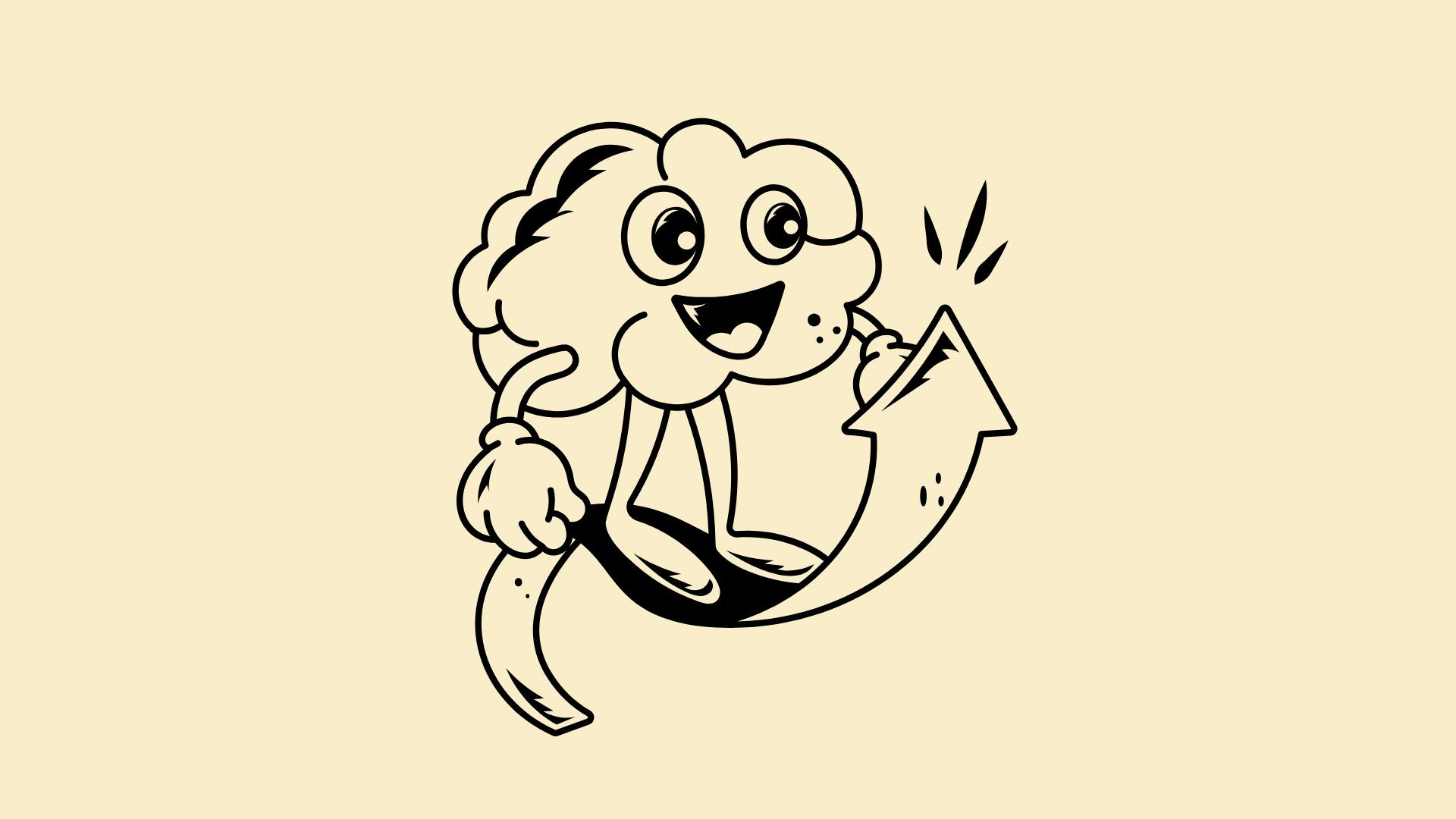Writing therapy notes can consume hours of your valuable time each week. As mental health professionals, you understand the importance of thorough clinical documentation, but the traditional note taking process often leaves you feeling overwhelmed.
AI therapy notes are transforming how therapists approach session documentation. These innovative tools help you create comprehensive progress notes without spending countless hours after each client session.
The best AI for therapy notes solutions streamline your workflow while maintaining the quality and accuracy your practice demands. You can finally reclaim your mental space and focus on what matters most - patient care.
The Challenge of Traditional Therapy Documentation
Most therapists spend 2–3 hours a day on note writing and admin work. That’s time you could be spending with clients—or just protecting your work-life balance.
Traditional note taking makes it even harder. You’re expected to recall every detail from therapy sessions, often hours or days later. That scramble to remember can be exhausting.
And when your caseload is full, writing detailed session notes only adds more pressure. No surprise that many mental health professionals feel burned out by the documentation load.
How AI Therapy Note Solutions Work
AI note generators pull from your session data to create structured progress notes. They’re built to understand clinical language and match your preferred note formats.
Most ai therapy tools work with session recordings (as long as you have client consent). They turn your audio into clear, usable therapy notes that capture key points from each session.
AI progress notes also help standardize your documentation. You’ll notice better note quality and more consistency across all your records.
Essential Features to Look For
HIPAA compliance is non-negotiable. Any ai tool should protect sensitive patient health information and meet all regulatory standards.
Choose tools that support different note types—like SOAP notes, DAP notes, or other structured formats. Bonus if the system lets you customize note templates to fit your workflow.
Make sure it works for both in person sessions and telehealth. Your platform should be flexible enough to handle various settings without missing a beat.
Look for real time insights and session summary features too. These help you track progress and improve your treatment planning without extra effort.
Top AI Solutions for Therapy Notes
1. Supanote
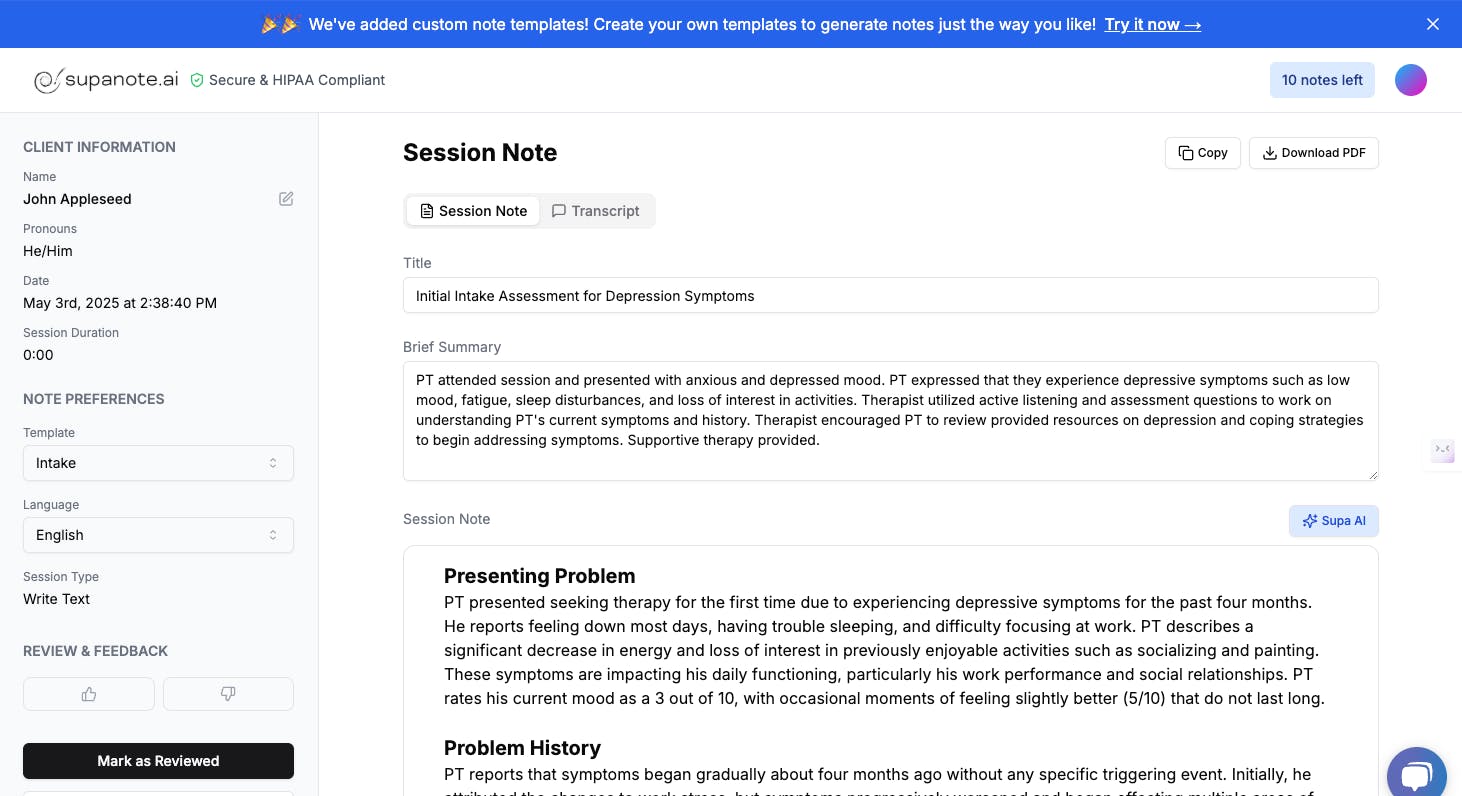
Supanote stands out as the only AI therapy notes tool built exclusively by and for mental health professionals. It offers native EHR integration that feels natural in your clinical documentation workflow.
- Native EHR autofill: The ‘Super Fill’ button directly populates your EHR fields without copy-paste workflows for progress notes
- Deep personalization: Learns your documentation style and client-specific clinical language over time
- Therapist-friendly interface: Minimal setup required with intuitive design.
- HIPAA-compliant infrastructure: Built with mental health privacy requirements from the ground up
Pricing: Basic plan at $29.99/month for 40 notes, Professional at $49.99/month for 100 notes, Premium at $89.99/month for unlimited notes. 14-day free plan trial with 20% annual discount.
Best suited for: Solo practitioners and small group practices using major EHRs who want seamless integration without workflow disruption.

2. Mentalyc
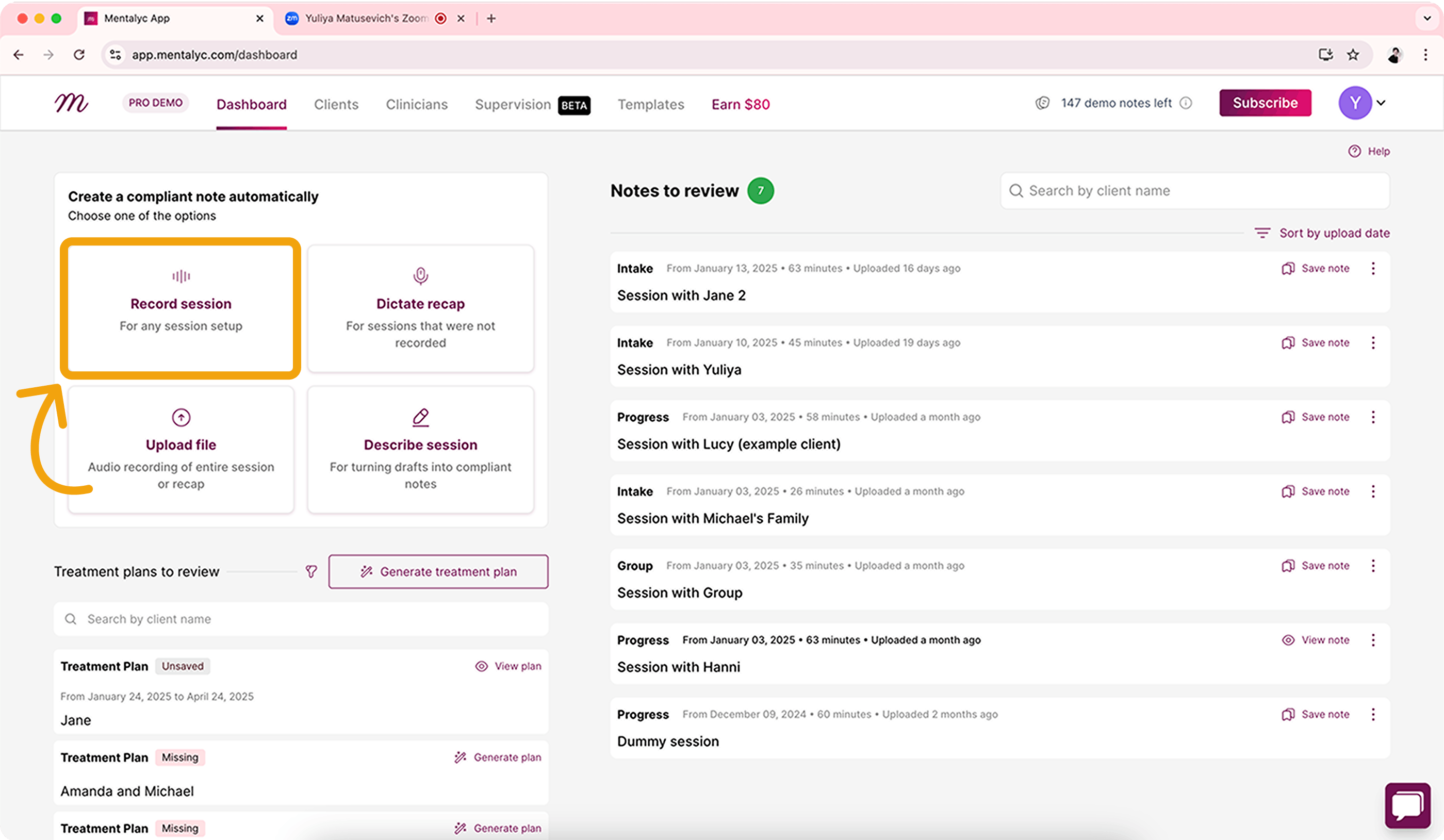
Mentalyc has built a solid reputation in AI therapy with structured progress notes and team-friendly core features that work well for established practices.
- SOAP/DAP note formats support: Pre-built note templates specifically designed for mental health documentation standards
- Team collaboration features: Share note templates and maintain consistency across multiple mental health professionals
- Copy-paste workflow to EHRs: Transfer your threapy notes by copy pasting the note from Mentalyc to different EHR's.
- Customizable note formats: Adapt templates to match your specific documentation requirements
- Progress tracking: Built-in AI note generator tools to monitor client session progress over time
Pricing: Mini plan at $19.99/month for 40 notes, Professional at $39.99/month for 100 notes, Premium at $69.99/month for unlimited notes. Team discounts available with 16.7% annual savings.
Best suited for: Group practices wanting structured notes and teams needing consistent note formats across multiple therapists.
3. Upheal
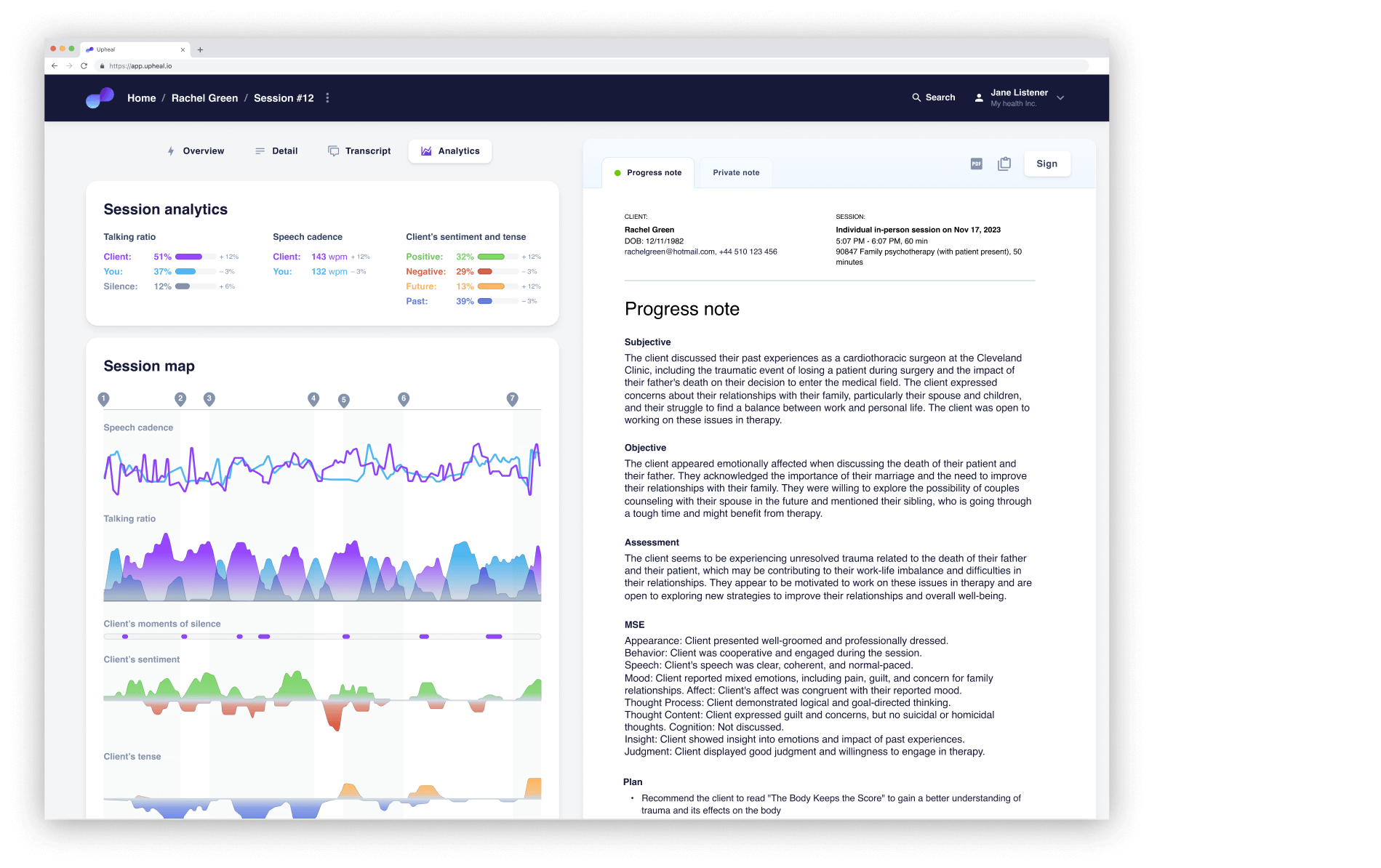
Upheal combines AI note generation with a complete telehealth platform, making it ideal for practices focused on remote therapy sessions delivery.
- Unlimited basic notes on free plan: Genuine free tier with unlimited basic note generation
- Integrated telehealth platform: Conduct therapy sessions and generate notes within the same system
- Session analysis and insights: AI-powered analytics to identify patterns in client progress
- Built-in scheduling: Complete practice management tools included
- Real time insights: Live session notes that update as you speak during therapy sessions
Pricing: Free unlimited basic notes, Plus at $19/month, Premium at $35/month, Pro at $69/month. 14-day premium trial with 20% annual discount.
Best suited for: Telehealth-focused practices wanting an all-in-one solution and therapists looking to try ai therapy documentation risk-free.
4. Blueprint - Session-Based Mental Health AI
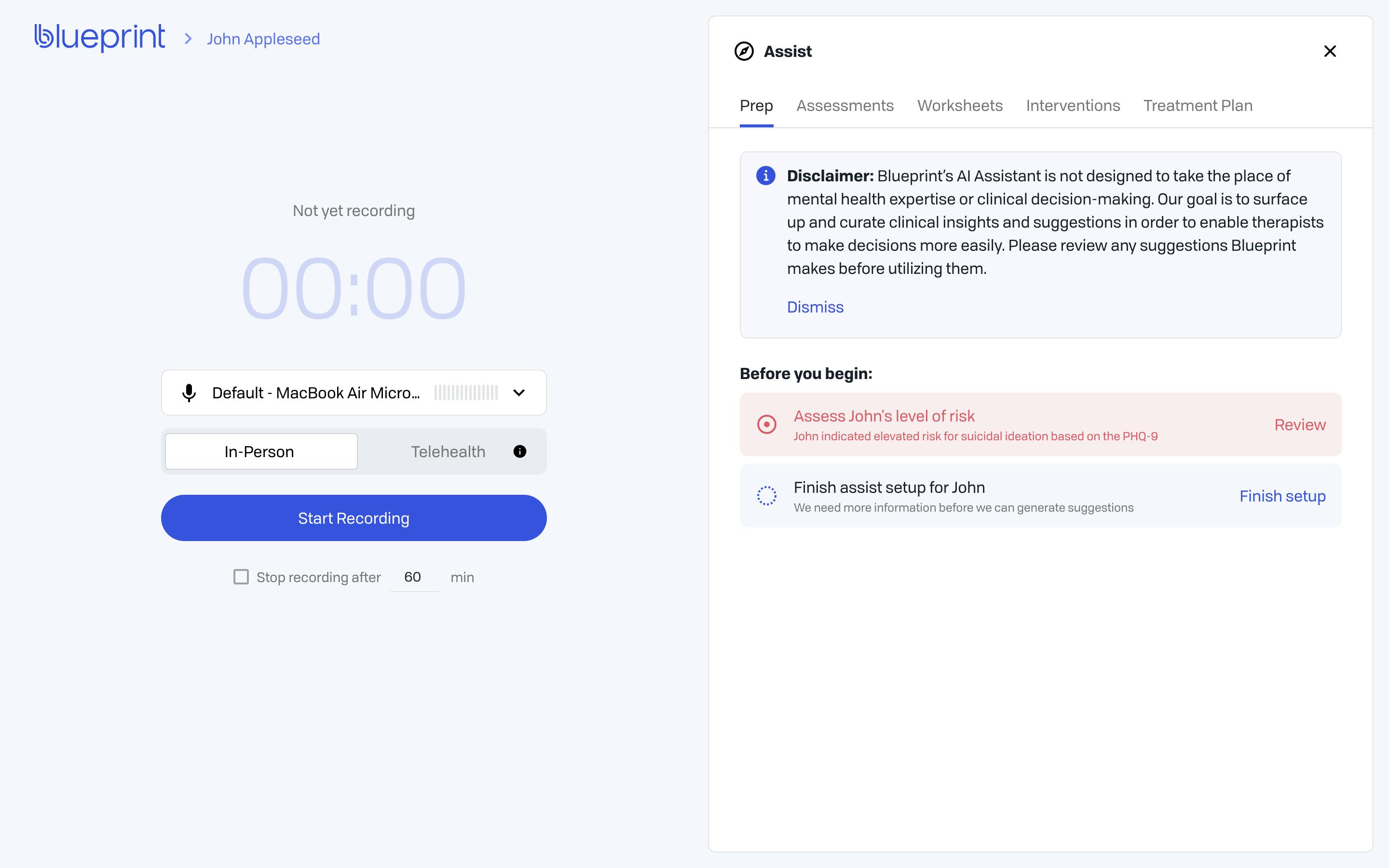
Blueprint offers a unique session-based pricing model that can be cost-effective for high-volume practices with predictable caseloads.
- Session-based pricing model: Pay per session rather than monthly subscriptions for unlimited notes
- Mental health-specific templates: Purpose-built note formats for therapy sessions documentation
- Multi-therapist support: Built to support group practices with user management and shared access settings
- Secure client data handling: Fully HIPAA-compliant platform with end-to-end encryption and audit trails
Pricing: Starting at $29/month with session-based scaling. Currently offering 50% off first 3 months promotion.
Best suited for: High-volume practices with consistent session loads and therapists who prefer usage-based pricing over unlimited models.
5. Quill Therapy Notes - Summary-Based Documentation
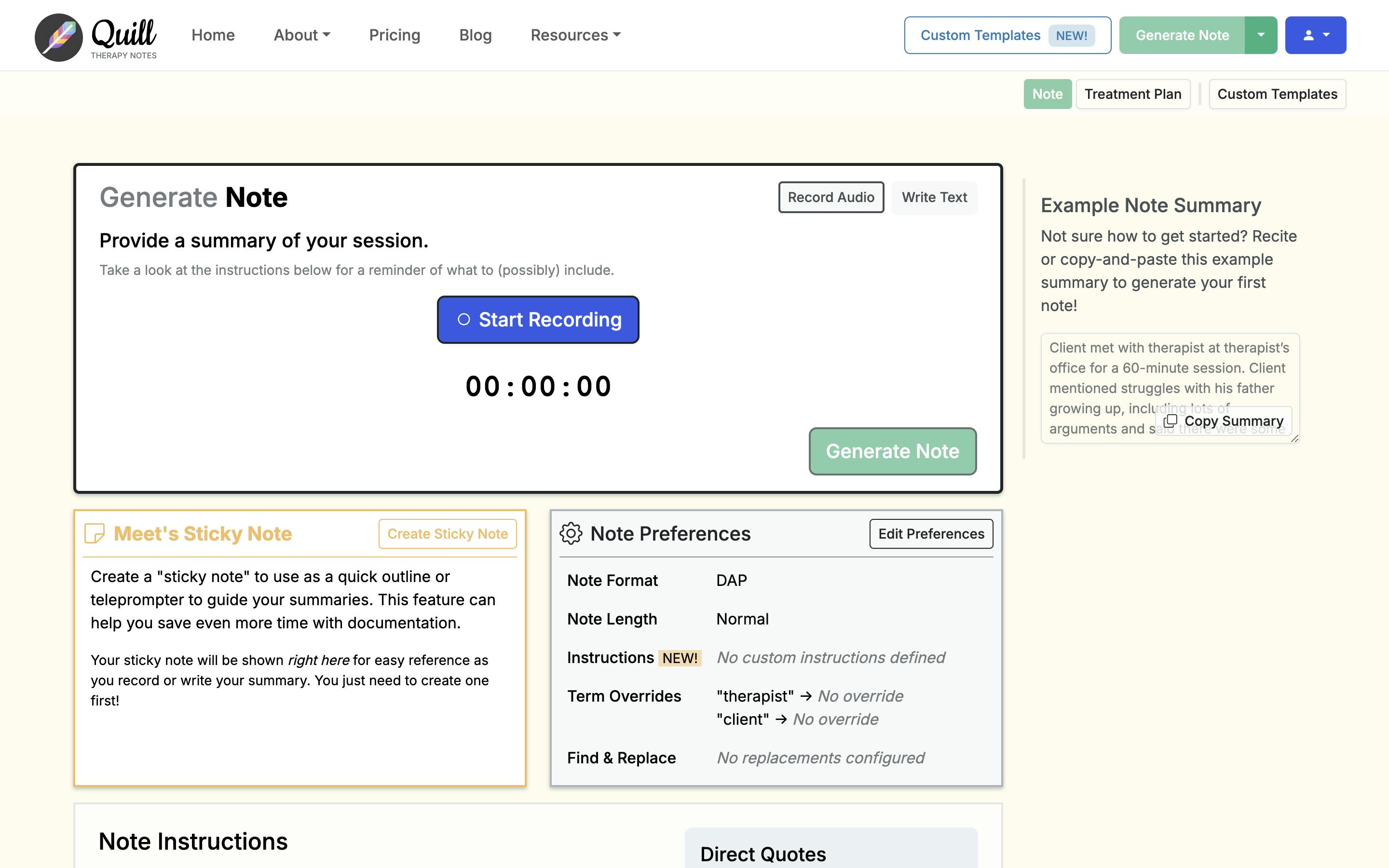
Quill takes a privacy-first approach by generating notes from written summaries rather than session recordings, appealing to privacy-conscious mental health professionals.
- No session recording required: Create progress notes from brief summary you provide
- Summary-based note generation: Transform your session notes into comprehensive clinical documentation
- Unlimited notes on base plan: No usage limits on the individual plan for AI therapy notes
- Privacy-focused approach: Eliminates concerns about recorded session data and client data protection
- Quick turnaround: Fast AI note generation from minimal input
Pricing: Individual plan at $20/month for unlimited notes, Team plan at $16/month per user with volume discounts available. 14-day free trial with no credit card required.
Best suited for: Privacy-conscious therapists who prefer not to record sessions and practitioners comfortable with summary-to-note workflows.
6. Freed.ai - General Medical AI (Therapy Compatible)
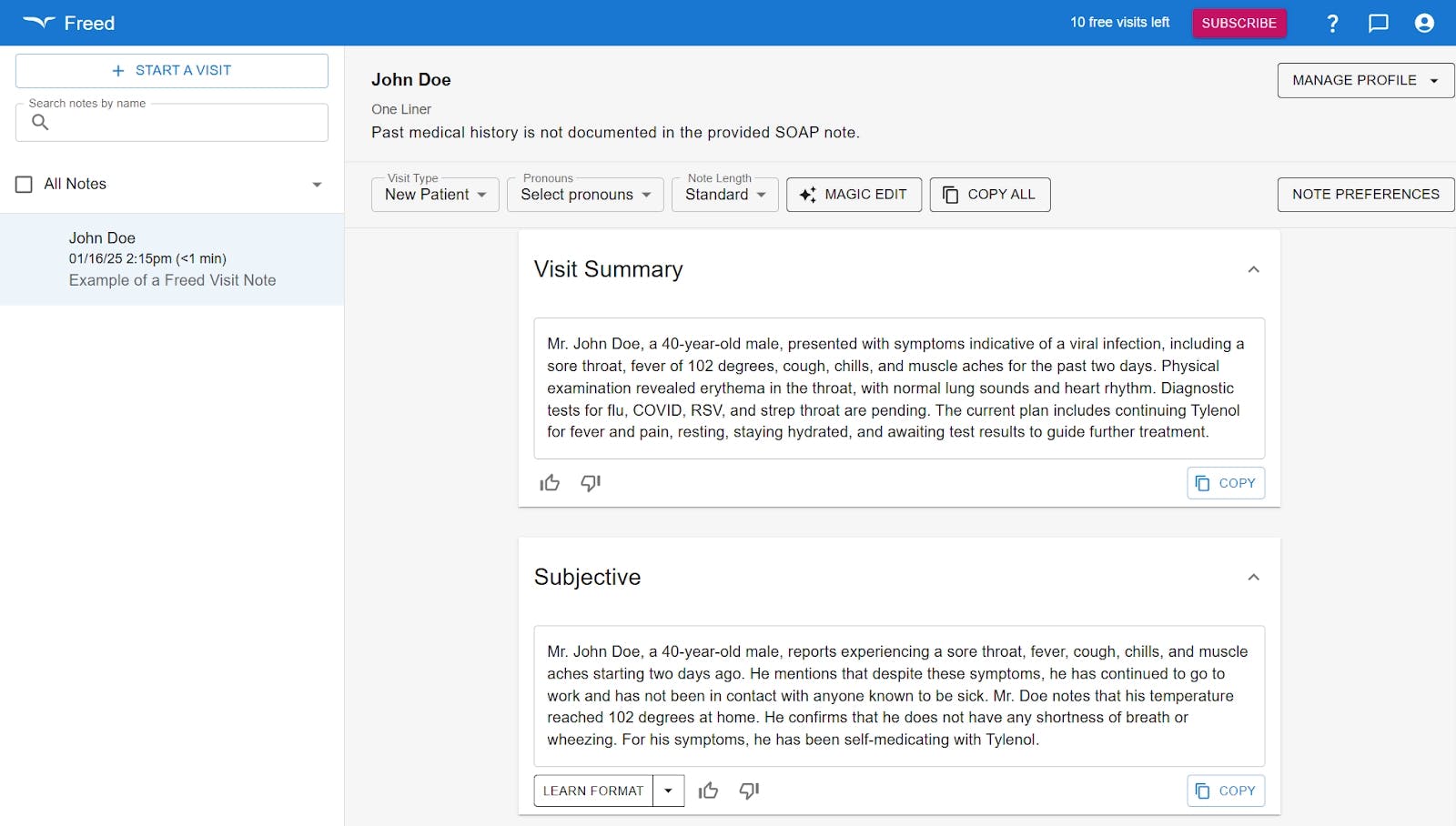
Freed.ai serves all medical specialties including mental health, offering robust documentation capabilities for multi-disciplinary practices.
- Works across all medical specialties: Single AI tool for diverse healthcare professionals documentation needs
- Unlimited notes model: No usage restrictions on the premium plan for progress notes
- Strong accuracy for general medical notes: Proven track record across healthcare specialties with ai progress capabilities
- Multi-provider support: Handles various mental health professionals documentation styles
- Cross-specialty integration: Useful for group practices offering multiple services
Pricing: Premium at $99/month for unlimited notes, Group pricing at $84/month for 2-9 users. 10 visits free trial available.
Best suited for: Multi-specialty practices combining mental health with other medical services and large practices needing unlimited documentation across disciplines.
7. Therabill
Therabill integrates AI note capabilities with comprehensive billing solutions for mental health practices. The platform handles both clinical documentation and revenue cycle management for healthcare professionals.
The AI therapy system creates structured progress notes while automatically updating treatment plans. Most therapists appreciate how the platform connects session notes directly to billing codes and insurance requirements.
Key Features:
- AI progress notes with billing integration
- Treatment plans coordination with session data
- Multiple clinical documentation formats
- Insurance-compliant progress notes
- Secure client data management
Pricing: Custom pricing based on practice size and core features needed.
AI Therapy Note Tools Comparison
Here’s a side-by-side comparison of the top 7 AI tools for therapy notes to help you quickly evaluate your options:
Tool | Starting Price | Best For | Standout Feature |
|---|---|---|---|
Supanote | $29.99/month | Therapists who want seamless EHR integration | Native Super Fill button for instant EHR autofill |
Mentalyc | $19.99/month | Group practices using SOAP/DAP formats | Strong team features with customizable templates |
Upheal | Free (basic) | Telehealth-heavy practices | Built-in telehealth with session analytics and real-time note updates |
Blueprint | $29/month | High-volume clinics preferring usage-based pricing | Session-based billing with mental health templates |
Quill | $20/month | Privacy-focused solo therapists | Summary-based note generation—no session recording needed |
Freed.ai | $99/month | Multi-specialty and high-caseload practices | Works across medical specialties with unlimited usage |
Therabill | Custom pricing | Practices needing billing + documentation in one | AI-generated notes tied directly to billing codes and treatment plans |
This comparison highlights the diverse approaches each tool takes to AI-powered therapy documentation, from Supanote’s native EHR integration to Upheal’s comprehensive telehealth platform.
How to Choose the Best AI for Therapy Notes
Selecting the right AI therapy notes solution requires evaluating several key factors. Consider your practice’s specific needs, budget constraints, and integration requirements when making this decision.
Security and HIPAA Compliance
HIPAA compliance remains non-negotiable when handling sensitive therapy sessions and patient health information. Verify that any AI tool meets Health Insurance Portability and Accountability Act requirements before implementation.
Look for platforms that encrypt session recordings and store client data on secure servers. The AI assistant should process notes without compromising patient care standards or violating privacy regulations.
Integration Capabilities
Choose AI therapy solutions that integrate with your existing practice management systems. Seamless data flow between note taking platforms and scheduling software saves time and reduces administrative burden.
Consider how the AI note system will work with your current electronic health records. The best integration allows you to generate notes and update treatment plans without switching between multiple applications.
User Experience and Learning Curve
Most therapists adapt to AI therapy notes tools within their first few sessions. The learning curve varies depending on your current note taking methods and comfort with technology.
Traditional note taking often requires you to spend hours writing detailed session notes after each client session. AI note generator tools reduce this time significantly while improving note quality.
You’ll find that AI powered note taking becomes intuitive quickly. The simple note taking interface allows you to focus on your clients rather than documentation during therapy sessions.
Implementation Timeline
Week 1: Set up your AI therapy platform and explore core features. Review note templates and select your preferred format for progress notes.
Week 2-3: Begin using session recordings with client consent for generating AI progress notes. Practice with different note types including SOAP notes and DAP notes.
Month 2: Integrate AI note writing into your regular workflow. Most therapists report significant time savings and improved clinical documentation quality by this point.
Cost-Benefit Analysis for Mental Health Professionals
The investment in AI therapy notes platforms typically pays for itself within the first month. Consider the time you currently spend on documentation versus patient care.
Many platforms offer a free plan with basic note generation capabilities. These free notes help you evaluate the technology before committing to paid features like unlimited notes or advanced treatment plans.
No credit card required for most free trials. This allows healthcare professionals to test AI note tools without financial commitment.
Impact on Client Care
AI therapy reduces administrative burden, giving you more mental space to focus on therapeutic relationships. Session recordings capture nuances you might miss while taking manual notes during in person sessions.
Structured progress notes generated by AI ensure consistent clinical language across all your documentation. This standardization improves care continuity and treatment plans effectiveness.
The brief summary feature helps you quickly review key points from previous sessions. Real time insights from AI analysis can inform your therapeutic approach.
Privacy and Compliance Considerations
HIPAA compliance remains your responsibility when using AI therapy notes tools. Ensure your chosen platform maintains proper HIPAA compliant safeguards for sensitive patient health information.
Client data protection involves secure session data storage and encrypted audio recordings. Review the accountability act requirements with your platform provider.
Sensitive therapy sessions require additional consideration for recording sessions. Always obtain explicit client consent before using AI note generation with session recordings.
Future of AI in Mental Health Documentation
AI training continues to improve note accuracy and clinical relevance. Expect better integration with existing electronic health records and smart treatment plans.
The technology will likely expand beyond basic note writing to include more sophisticated analysis of therapy sessions patterns and outcomes.
Mental health professionals who adopt these tools early will have advantages in efficiency and client care quality. The future points toward AI becoming standard in therapeutic practice.
FAQ's
Q: What is the best AI tool for therapy notes in 2026?
A: The best AI therapy note tool depends on your needs. Supanote is ideal for seamless EHR integration. Mentalyc excels at SOAP/DAP notes. Upheal offers telehealth integration. Each has strengths—compare features, pricing, and workflow fit before deciding.
Q: Are AI therapy note tools HIPAA-compliant?
A: Most top AI therapy note tools—including Supanote, Therabill, and Mentalyc and others —are HIPAA-compliant. Always verify encryption, data handling, and consent protocols before use.
Q: Do I need to record sessions to use AI therapy notes?
A: Not always. Some tools, like Quill, generate notes from summaries or manual inputs. Others, like Supanote and Mentalyc, offer audio transcription from recorded sessions for more detailed notes.
Q: How accurate are AI-generated therapy notes?
A: Accuracy depends on the tool’s training and input method. Tools trained on clinical language, like Supanote and Mentalyc, produce high-quality, structured notes that often require minimal edits.
Q: Can AI tools generate different note formats like SOAP, DAP, or BIRP?
A: Yes. Most platforms support multiple formats including SOAP, DAP, BIRP, and custom templates. Supanote, for instance, offers support for over 7 note formats including GIRP, SIRP, and PIE.
Q: How much do AI therapy note tools cost?
A: Prices vary. Tools like Upheal offer free plans, while others start at $19–$39/month. Higher-tier plans often unlock unlimited notes, EHR integration, or real-time transcription.
Q: How do these tools impact client care?
A: By reducing time spent on documentation, AI tools let you focus more on your clients. They also support better continuity of care through standardized, consistent note quality.
Q: Can AI therapy notes work with both in-person and telehealth sessions?
A: Yes. Most tools, like Supanote and Mentalyc, work across both formats. Some even provide telehealth-specific features like live transcription (e.g., Berries).
Q: What if I switch EHRs or practices—will the AI tool still work?
A: Tools like Supanote are designed to work independently of specific EHRs. Their native EHR integration and autofill features allow smooth transition even if you change systems.
Q: Is there a learning curve to using AI note generators?
A: Most users adapt within 1–2 weeks. Platforms like Supanote and SimplePractice are designed for quick onboarding, with intuitive interfaces and minimal setup time.
Conclusion
AI therapy notes represent a significant advancement for mental health professionals seeking to improve their documentation efficiency. These AI note tools transform how you handle progress notes, session notes, and clinical documentation.
The best AI for therapy notes platforms offer comprehensive solutions that save time while maintaining high note quality. From SOAP notes to structured progress notes, AI progress systems handle various note types effectively.
Implementing AI note taking in your practice means less time on administrative tasks and more focus on client care. The technology supports rather than replaces your clinical judgment.

